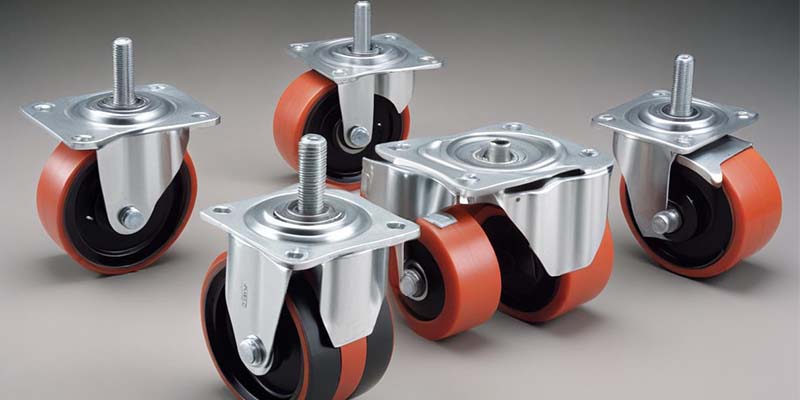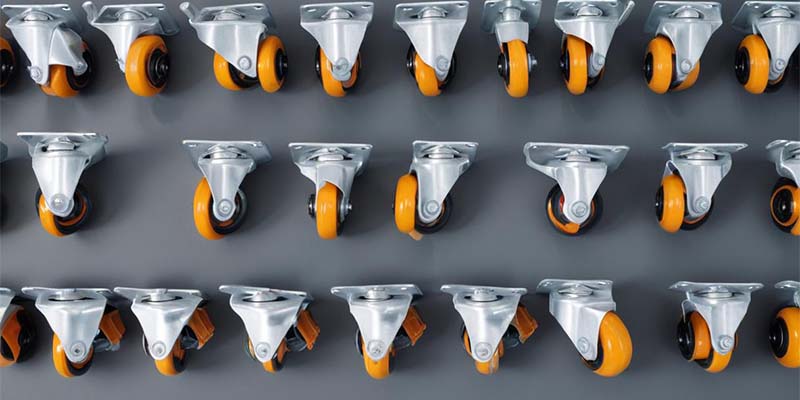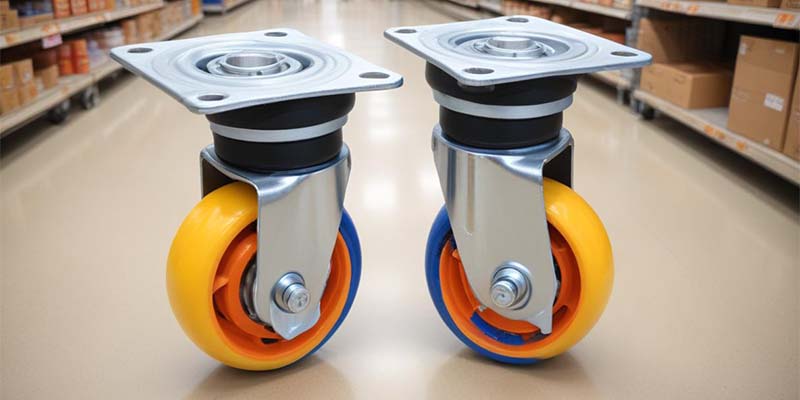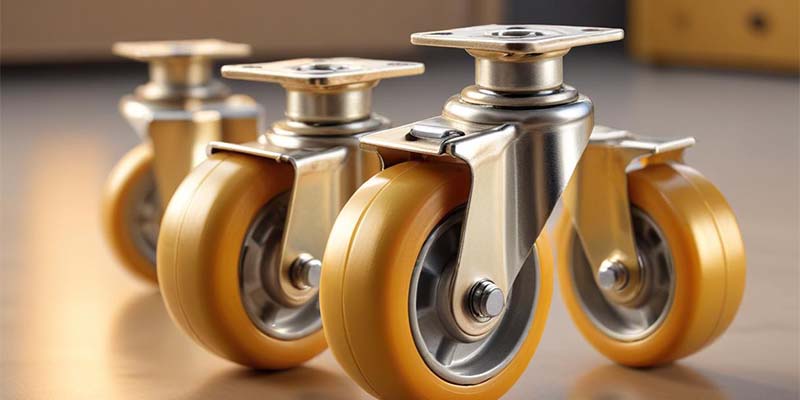Exploring the Different Types of Casters and Their Applications
Aug 19th 2024
Casters are essential components in numerous industries, providing mobility and flexibility for various applications. These versatile wheels and assemblies are crucial in facilitating the movement of heavy equipment, furniture, and machinery. Their significance extends across multiple sectors, including manufacturing, healthcare, logistics, and retail.
Learning about the different types of casters and their specific uses is vital for selecting the right one for your needs. Each type has unique features and benefits designed to meet particular demands, from heavy-duty industrial casters to specialized medical casters.
What Are Casters?
Casters are wheeled devices attached to the bottom of larger objects, enabling easy movement and mobility. They come in various sizes, materials, and designs, each suited for specific functions and environments.
Casters play a critical role in improving efficiency and safety in different settings. In industrial environments, heavy-duty casters enable the transport of bulky machinery and materials, reducing the physical strain on workers. In healthcare, medical casters ensure the smooth movement of hospital beds, medical carts, and equipment, enhancing patient care and staff efficiency. Retail and logistics sectors rely on casters to move inventory, stock shelves, and supply chains seamlessly.
Types of Casters

There are different types of casters designed for various industries and uses. Here is a list of a few such caster types you will come across:
Swivel Casters
Swivel casters rotate 360 degrees, allowing for exceptional maneuverability. They are ideal for applications requiring frequent changes in direction, such as shopping carts and office chairs. They also ease navigation in confined spaces and are commonly used in healthcare and retail environments.
Rigid Casters
Rigid casters, also known as fixed casters, only allow straight-line movement. They are typically paired with swivel casters to balance maneuverability and stability. Commonly used in heavy-duty industrial applications, rigid casters are sturdy and reliable solution for transporting heavy loads over long distances.
Locking Casters
Locking casters offer the combined benefits of mobility and stability. Equipped with a locking mechanism, these casters can be fixed to prevent movement, ensuring safety and stability when needed. Locking casters come in both swivel and rigid designs for versatile applications.
Plate Casters
Plate casters are mounted using a flat, rectangular plate with four bolts, providing a secure and stable attachment. These casters are suitable for heavy-duty applications and are commonly found on industrial carts, machinery, and heavy equipment. The broad plate ensures even weight distribution and improves stability.
Stem Casters
Stem casters are designed with a stem that inserts into a socket or hole in the equipment or furniture. They offer a versatile mounting option, often used in office furniture, medical equipment, and light-duty carts. Stem casters can be easily replaced or upgraded, providing flexibility in maintenance and customization.
Bolt Hole Casters
Bolt-hole casters feature a single bolt hole for mounting, offering a straightforward and secure attachment method. They are commonly used in applications where a compact and simple mounting solution is needed, such as furniture and light-duty equipment.
Material Considerations for Casters

Casters are made from various materials, each offering unique benefits for specific applications. Common materials include:
Rubber Wheels
Rubber wheels provide excellent shock absorption and floor protection, ensuring a smooth and quiet ride. They are ideal for indoor applications, such as office furniture and healthcare equipment, as they reduce noise and prevent floor damage. Rubber wheels also do not mark and offer good traction.
Polyurethane Wheels
Polyurethane wheels balance durability and floor protection, resisting wear, chemicals, and abrasion. Suitable for industrial and commercial applications, they offer a smooth roll on various surfaces. These wheels are non-marking and provide a quieter operation compared to harder materials, making them versatile and reliable.
Nylon and Plastic Wheels
Nylon wheels and plastic wheels are lightweight and resistant to moisture, chemicals, and corrosion. They are ideal for light-duty applications in environments like food service and laboratories. These wheels are non-marking and easy to clean, that provide a cost-effective solution for various settings.
Cast Iron and Steel Wheels
Cast iron wheels and steel wheels are highly durable and handle heavy loads, that make them ideal for industrial applications. They offer high strength and wear resistance but are more demanding on floors. These wheels suit challenging environments where durability and load capacity are paramount.
Specialty Casters

Certain casters are made with specialized materials and designed for executing heavy-duty tasks. Here are a few such types of casters to consider:
Shock-Absorbing Casters
Shock-absorbing casters are designed to minimize vibrations and impacts, protecting the load and the floor surface. These casters feature built-in suspension systems, which make them ideal for transporting delicate or sensitive equipment. They are commonly used in medical, electronics, and logistics industries, where smooth transport is critical. The shock absorption capabilities also improve maneuverability over uneven surfaces, reducing noise and increasing overall comfort.
High-Temperature Casters
High-temperature casters are engineered to withstand extreme heat, making them ideal for bakeries, foundries, and industrial ovens. They maintain their integrity and functionality in conditions where standard casters would fail. High-temperature casters ensure safe and efficient mobility in challenging environments, protecting equipment from heat damage.
Stainless Steel Casters
Stainless steel casters offer superior corrosion resistance, making them ideal for wet or chemically harsh environments. Commonly used in food processing, medical facilities, and cleanrooms, stainless steel casters are easy to clean and maintain, ensuring hygiene standards are met. They also provide excellent durability and strength, withstanding frequent washing and exposure to various chemicals.
Choosing the Best Casters for Your Needs

Choosing the best casters for your needs involves considering several key factors to ensure optimal performance and longevity.
- Evaluate the load capacity to determine the weight each caster must support, factoring in the total load and any dynamic forces during movement.
- Assess the environment where the casters will be used. Consider floor type, temperature extremes, moisture, and chemical exposure.
- Different applications require different caster features, such as swivel casters for maneuverability in tight spaces or locking casters for stability in stationary applications.
- Consult manufacturers for recommendations, test casters under natural conditions, and prioritize high-quality materials to ensure durability.
- Correctly matching casters to your needs increases efficiency, safety, and equipment lifespan.
Applications of Casters in Various Industries
Using casters can improve workplace efficiency significantly. Here are a few industries that benefit from using casters immensely:
Retail and Office Facilities
Casters in retail and office settings help with mobility and efficiency. They are used on shopping carts, display racks, and office chairs, allowing easy rearrangement and smooth navigation. Casters facilitate quick layout changes, improve customer experiences, and streamline workplace ergonomics, promoting a more dynamic and flexible environment.
Manufacturing
Casters transport heavy machinery, raw materials, and finished products in manufacturing. They are essential for assembly lines, workstations, and material handling carts. Durable and robust casters reduce manual labor, increase productivity, and ensure the safe and efficient movement of goods within industrial facilities.
Warehouse and Distribution
Warehouses and distribution centers rely on casters to move pallets, racks, and trolleys. Casters streamline logistics efficiency by facilitating the quick transfer of goods and reducing handling time. They support heavy loads and provide maneuverability in tight spaces, ensuring smooth operations and optimized storage solutions.
Food Processing Bakeries
Casters are used on racks, tables, and carts in food processing and bakeries. Stainless steel and high-temperature casters withstand rigorous cleaning protocols and extreme heat. They ensure hygiene, ease of movement, and flexibility, allowing efficient workflow and compliance with health and safety standards.
Movies and Entertainment
The movie and entertainment industry uses casters on equipment such as camera dollies, lighting rigs, and set pieces. Casters provide smooth, silent movement essential for filming and stage setups. They enable quick scene changes, increase mobility, and safely transport expensive and delicate equipment.
Aerospace Defense Government
Casters are crucial in aerospace, defense, and government sectors for moving heavy machinery, aircraft parts, and sensitive equipment. Heavy-duty and precision casters provide stability, security, and ease of movement. They support logistical operations, maintenance tasks, and the efficiency of complex, high-stakes environments.
Automotive
Casters in the automotive industry facilitate the transport of tools, parts, and assemblies. Used on toolboxes, engine stands, and production carts, they streamline workflow and improve safety. Heavy-duty casters handle significant weights and provide mobility for efficient maintenance, repair, and assembly operations.
Healthcare
In healthcare, casters are essential for the mobility of medical equipment, hospital beds, and carts. They enable smooth, quiet, and safe transport of patients and devices. Specialized medical casters ensure easy maneuverability, improve patient care, and maintain hygiene standards in hospitals and clinics.
Waste Management
The waste management industry relies on casters to efficiently handle and transport bins and containers across various sectors. Casters enhance maneuverability in tight spaces, reduce manual labor, and improve operational efficiency, ensuring streamlined waste disposal processes.
Wrapping Up
Exploring the different types of casters and their applications highlights these components' critical role in enhancing mobility and efficiency across various industries. Knowing about each caster type's unique benefits and uses enables businesses to select the best solutions for their specific needs. Regular maintenance ensures longevity and optimal performance. For tailored caster solutions that meet the demands of any industry, trust Atlanta Casters. We offer a comprehensive range of high-quality casters that support diverse applications, from manufacturing to healthcare. Contact Atlanta Casters today to find the perfect caster for your requirements.




 Email US
Email US
 Hours
Hours
 Visit Our Showroom
Visit Our Showroom




